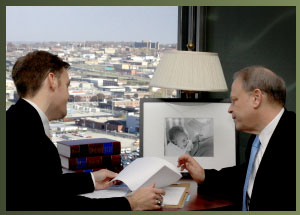Preference vs Fraudulent Conveyance Litigation
Kansas City Business Bankruptcy Attorneys Providing Solid Defense

In a Chapter 7 (and occasionally Chapter 11) bankruptcy, the bankruptcy trustee’s main responsibilities are to sell assets and collect money to repay creditors. In that regard, the trustee is on the creditor’s side. He or she represents unsecured creditors and makes sure they receive as much as they can in the bankruptcy. However, the trustee can also force creditors to give back certain money the debtor paid to them or property the debtor transferred to them. The United States Bankruptcy Code imposes a number of duties upon a bankruptcy trustee and grants the trustee many powers to accomplish these duties. If your business received funds or property from another business right before that business filed bankruptcy, our business bankruptcy attorneys can represent you against actions by the trustee in preference lawsuits and fraudulent conveyances.
The lawyers at The Sader Law Firm have a wealth of experience in bankruptcy law. Therefore, if a bankruptcy trustee has sent your business a letter asking for information about payments received, has demanded repayment of certain funds paid prior to a bankruptcy filing, or filed a preference avoidance lawsuit or a fraudulent conveyance lawsuit against your business, we can provide a solid defense. We handle every business bankruptcy issue with speed, accuracy, cost-effective and responsive service. Our law office is thoroughly familiar with the bankruptcy process and our interests in keeping as much as you are entitled to keep. Because of this, we take our work in this legal area very seriously. Bankruptcy is not just a side practice that we dabble in from time to time. It has been the central focus of our work on behalf of businesses and individuals for over 30 years.
What is a Preference?
Under federal bankruptcy law, a preferential transfer occurs when the person or entity that filed bankruptcy made a payment to a creditor:
- On a debt the debtor incurred before the debtor made the transfer;
- While the debtor was insolvent;
- Within 90 days prior to the date the debtor filed bankruptcy; and,
- That pays the creditor more than the creditor would have received in a Chapter 7 case if the debtor had not made the payment.
Although accepting such a payment is not wrongdoing, the bankruptcy trustee can still avoid that transfer and force your business to turn that money over to the bankruptcy estate.
What Happens During a Preference Action?
There are many defenses available to a preference action. For example, when the debtor is a business, the trustee cannot avoid a preferential transfer unless the transfer is $5,000 or more. Additionally, the trustee also cannot avoid a transfer that occurred in the ordinary course of the debtor’s business or if the debtor received something in return for the transfer within a certain time period after the transfer.
If a trustee has sued your business for a preference, these are only a few of the defenses available. Whether these defenses apply to your situation will ultimately be up to the bankruptcy judge. You will need experienced business bankruptcy attorneys on your side to make sure the defenses are presented and argued properly before the court.
What is a Fraudulent Conveyance?
A fraudulent conveyance occurs when the debtor transferred money or property to another entity for less than market value or for the purpose of hiding the money or property from other creditors. The trustee’s complaint can specify actual fraud. This means the trustee has to show that the transfer was made with the intent to hinder, delay and defraud creditors, or constructive fraud, which does not require any actual intent to defraud.
If your business received money or property from another business that later filed bankruptcy, the bankruptcy trustee could try to sue to regain that money or property, even if you no longer have it. Your business’ intent in receiving the money is irrelevant. Your business could be on the hook without having done anything wrong.
Attorney for Business Preference Actions in Missouri
We have helped many businesses in Kansas and Missouri defend against both preference lawsuits and fraudulent transfer lawsuits. This saved clients millions of dollars and made sure to protect their interests. If you have received a demand letter from a bankruptcy trustee or if a bankruptcy trustee has filed a lawsuit against you alleging a preferential transfer for a fraudulent conveyance, reach out to our bankruptcy lawyers right away for a free consultation. You have a limited amount of time to respond. The Sader Law Firm can make sure you use all defenses available to protect your bottom line.
 Book an
Book an Email
Email Directions
Directions







